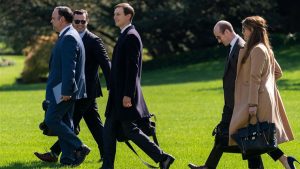LONDON — As news of President Donald Trump’s shock diagnosis with Covid-19 spread Friday, the experience of United Kingdom Prime Minster Boris Johnson, who tested positive six months ago, could offer a clue to what might come next.
Johnson, 55, announced on March 27, at the height of the the pandemic in the U.K., that he was suffering “mild” symptoms and would self-isolate while continuing to work. He was thought to be the first world leader confirmed to have contracted Covid-19.
He kept in contact with ministers through what he called the “wizardry of modern technology,” and 10 Downing Street, his official residence and personal office, maintained that he was in control.
British Prime Minister Boris Johnson speaking in the House of Commons in London in July.Jessica Taylor / AFP – Getty Images
Then, on April 6 Johnson was rushed to a London hospital on the advice of his doctor before being placed in an intensive care unit. He spent a week in the hospital and received oxygen treatment but was not put on a ventilator. Queen Elizabeth II was kept informed of his status, Buckingham Palace said.
Foreign Minister Dominic Raab, who deputized in Johnson’s absence, told a press conference the next day that Johnson was still in control of the government — but he admitted he hadn’t spoken to him since before his hospitalization.
On his release, and as he began a period of recuperation at his house in the English countryside, Johnson won praise for a heartfelt message in which he thanked the National Health Service for “saving my life.” Referring to how serious his condition was, Johnson said “it could have gone either way.”
Brazilian President Jair Bolsonaro wears a protective mask at a ceremony in May. He has tested positive for the coronavirus.Andre Borges / Bloomberg via Getty Images file
It wasn’t until Monday April 27 that Johnson finally returned to work. Johnson has dismissed ongoing press speculation that the illness has given him long-term symptoms, saying Tuesday he was “fit as a butcher’s dog.”
The episode was a sober wake-up call to Britons, many of whom were skeptical about the severity and threat of the virus.
And it brought into sharp relief the criticism that the U.K. was far too slow to react to the pandemic. Johnson was personally attacked for a cavalier attitude to the virus: He boasted at a press conference on March 3 that he had been shaking hands with people at a hospital overloaded with coronavirus patients.
It later transpired that the government’s own scientific advisors had by that point privately called for a public warning against hand shaking. The prime minister’s spokesperson said he did not see this advice.
Trump joins a growing list of current and former world leaders to contract the virus.
Brazilian President Jair Bolsonaro — who had for months downplayed the severity of the pandemic — announced his illness in July. Like Trump, he promoted the use of malaria drug hydroxychloroquine to fight Covid-19. Brazil has the third-highest number of coronavirus infections, approaching 5 million.
Juan Orlando Hernández, the president of Honduras, announced in June that he and his wife tested positive, and Guatemalan president Alejandro Giammattei tested positive in September.
In Europe, Prince Charles, the 71-year-old heir to the British throne, tested positive in March, as did the European Union’s chief Brexit negotiator, French politician Michel Barnier.



















